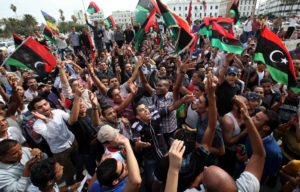 As Libyans celebrate the end of almost 42 years of dictatorial rule by Muammar al-Qaddafi you may be wondering what role the U.S. played in the dramatic final hours of Qaddafi’s life. According to most reports, as the fall of Sirte became certain, Qaddafi fled in an armed convoy hoping to escape yet again and live to fight another day. That day will never come thanks to a U.S. predator drone that targeted the convoy and set in motion the events leading to his bloody confrontation with rebels he still called his “sons.” This report in The New York Times provides the following details:
As Libyans celebrate the end of almost 42 years of dictatorial rule by Muammar al-Qaddafi you may be wondering what role the U.S. played in the dramatic final hours of Qaddafi’s life. According to most reports, as the fall of Sirte became certain, Qaddafi fled in an armed convoy hoping to escape yet again and live to fight another day. That day will never come thanks to a U.S. predator drone that targeted the convoy and set in motion the events leading to his bloody confrontation with rebels he still called his “sons.” This report in The New York Times provides the following details:
Before the convoy had traveled two miles, NATO officials said, it was set upon by an American Predator drone and a French warplane. With the attack the convoy “was stopped from progressing as it sought to flee Surt but was not destroyed,” Defense Minister Gérard Longuet of France said. Only two vehicles in the convoy were hit, neither carrying Colonel Qaddafi, a Western official said. But the rest of the convoy was forced to detour and scatter.
This video report from NBC news provides more details:
So while it may be technically correct to credit the U.S. drone strike it would be more accurate to say it was a NATO attack on the convoy that started the countdown to the final hours of Qaddafi’s life. While noting the crucial U.S. role in Libya operations, President Obama, in his statement, also focused on the NATO coalition:
Faced with the potential of mass atrocities — and a call for help from the Libyan people — the United States and our friends and allies stopped Qaddafi’s forces in their tracks. A coalition that included the United States, NATO and Arab nations persevered through the summer to protect Libyan civilians. And meanwhile, the courageous Libyan people fought for their own future and broke the back of the regime […] For nearly eight months, many Americans have provided extraordinary service in support of our efforts to protect the Libyan people, and to provide them with a chance to determine their own destiny. Our skilled diplomats have helped to lead an unprecedented global response. Our brave pilots have flown in Libya’s skies, our sailors have provided support off Libya’s shores, and our leadership at NATO has helped guide our coalition. Without putting a single U.S. service member on the ground, we achieved our objectives, and our NATO mission will soon come to an end.
The U. S. role in the death of Qaddafi is the same as the U.S. role in the Libyan military campaign: collaborative leadership of a coalition of the very willing. This is reflective of a larger (and still evolving) Obama Doctrine, defined by some as, “the use of intelligence, unmanned aircraft, special forces, and the leverage of teaming with others to achieve very narrowly defined but critical goals.” The removal of Qaddafi was that narrowly defined goal. How well Libya manages to avoid factionalism and civil war and build a new society is well beyond the scope of the allied mandate and there is little now for NATO and the U.S. to do but wish them well.
Photo Credit: The New York Times